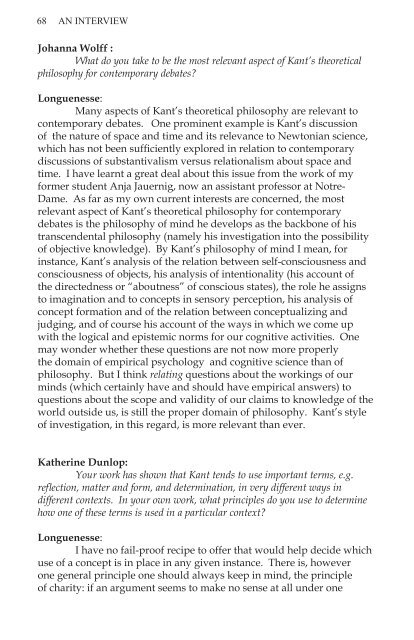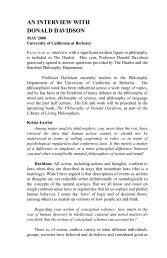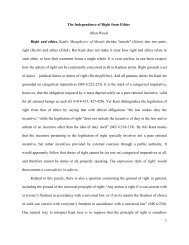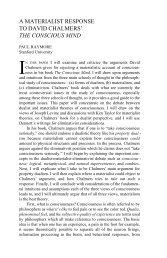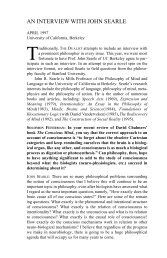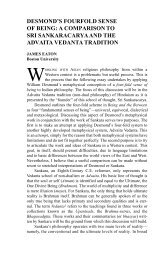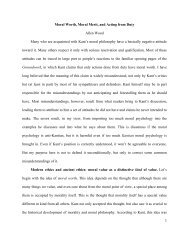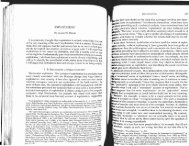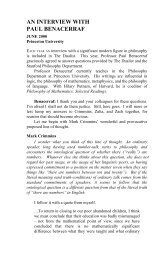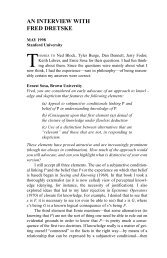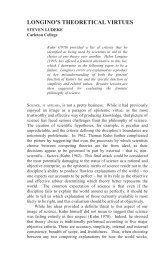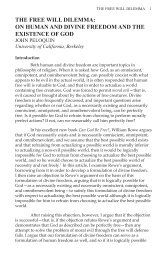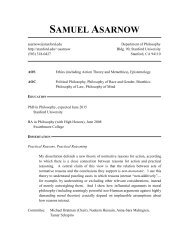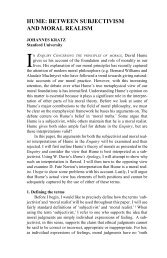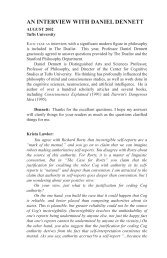An Interview with Beatrice Longuenesse - Stanford University ...
An Interview with Beatrice Longuenesse - Stanford University ...
An Interview with Beatrice Longuenesse - Stanford University ...
- No tags were found...
You also want an ePaper? Increase the reach of your titles
YUMPU automatically turns print PDFs into web optimized ePapers that Google loves.
68 AN INTERVIEWJohanna Wolff :What do you take to be the most relevant aspect of Kant’s theoreticalphilosophy for contemporary debates?<strong>Longuenesse</strong>:Many aspects of Kant’s theoretical philosophy are relevant tocontemporary debates. One prominent example is Kant’s discussionof the nature of space and time and its relevance to Newtonian science,which has not been sufficiently explored in relation to contemporarydiscussions of substantivalism versus relationalism about space andtime. I have learnt a great deal about this issue from the work of myformer student <strong>An</strong>ja Jauernig, now an assistant professor at Notre-Dame. As far as my own current interests are concerned, the mostrelevant aspect of Kant’s theoretical philosophy for contemporarydebates is the philosophy of mind he develops as the backbone of histranscendental philosophy (namely his investigation into the possibilityof objective knowledge). By Kant’s philosophy of mind I mean, forinstance, Kant’s analysis of the relation between self-consciousness andconsciousness of objects, his analysis of intentionality (his account ofthe directedness or “aboutness” of conscious states), the role he assignsto imagination and to concepts in sensory perception, his analysis ofconcept formation and of the relation between conceptualizing andjudging, and of course his account of the ways in which we come up<strong>with</strong> the logical and epistemic norms for our cognitive activities. Onemay wonder whether these questions are not now more properlythe domain of empirical psychology and cognitive science than ofphilosophy. But I think relating questions about the workings of ourminds (which certainly have and should have empirical answers) toquestions about the scope and validity of our claims to knowledge of theworld outside us, is still the proper domain of philosophy. Kant’s styleof investigation, in this regard, is more relevant than ever.Katherine Dunlop:Your work has shown that Kant tends to use important terms, e.g.reflection, matter and form, and determination, in very different ways indifferent contexts. In your own work, what principles do you use to determinehow one of these terms is used in a particular context?<strong>Longuenesse</strong>:I have no fail-proof recipe to offer that would help decide whichuse of a concept is in place in any given instance. There is, howeverone general principle one should always keep in mind, the principleof charity: if an argument seems to make no sense at all under one


